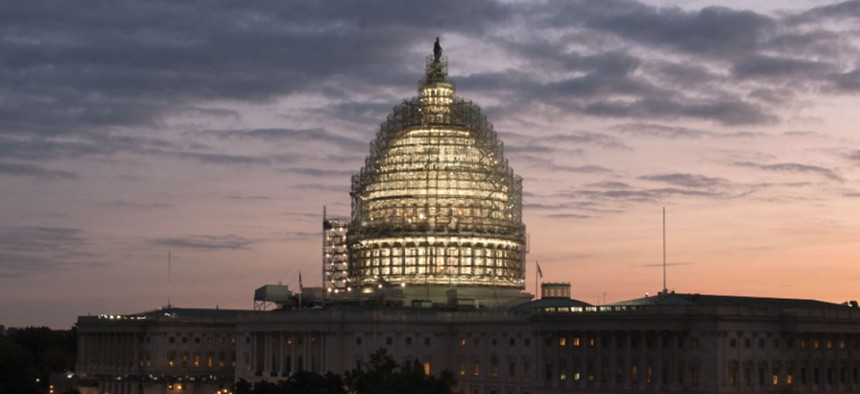
Architect of the Capitol
Spending Bill Remains Up in the Air as New Shutdown Deadline Approaches
The government is only funded through Wednesday, and the tax extenders deal is unfinished.
Congress managed to avoid a weekend session by passing a short-term spending bill at the end of last week, but they headed home to their districts Friday with two major pieces of legislation still very much up in the air.
With a Wednesday deadline to avoid a government shutdown, members of Congress still have not come to an agreement on how they’ll keep the doors open—nor have they reached a deal to make permanent some favored tax breaks for businesses and individuals. Congressional leaders and top tax negotiators planned to spend the weekend in Washington to hash out final deals on both packages, with leadership hopeful that an omnibus and tax deal could be posted in the House on Monday.
“Our projection is for the House to post an omnibus on Monday and vote on it by Wednesday,” Senate Majority Whip John Cornyn told reporters last week, emphasizing that the omnibus was not yet completed.
At issue for the omnibus spending bill are several policy riders preferred by each party. Republicans have variously pushed to lift the ban on crude-oil exports and to alter campaign finance laws, while Democrats have pressed to protect the Obama administration’s environmental regulations and for additional gun-restriction measures. As negotiators continue their talks through the weekend, leaders have remained mum about which policy riders are still under consideration.
“I think there are a few outstanding issues that have not been resolved. But it’s kind of one of those things where nothing’s resolved until everything’s resolved,” Cornyn said Thursday.
The hope, Cornyn added, is that once the House passes the funding bill—which could include a tax deal—Wednesday, the Senate can get a unanimous agreement to pass the bill that evening, avoiding the need for another short-term continuing resolution.
Still, House Appropriations Committee Chairman Harold Rogers said although the House expects to post a finished bill Monday, there could be a need for another short-term spending measure to give the Senate time to work through procedural hurdles.
He said, as members were leaving the Capitol on Friday, that many of the outstanding policy issues had been kicked up to leadership, so appropriators were waiting for a deal to be cut so they can write the bill, have it scored by the Congressional Budget Office, and post the text.
“Some of these things, the big policy questions, of course, will be dealt with by the leadership,” he said. “The run-of-the-mill appropriations stuff, we’ll take that up when leadership deals with the policy issues.”
There are still several issues left to resolve for Congress to pass a tax deal as well. Senate Finance Committee chairman Orrin Hatch said Thursday that he would stay in Washington through the weekend to try to get a larger deal on tax extenders, but suggested that negotiators may soon have to move on to a two-year extension of current policy if a larger deal can’t be made.
“Both sides are doing their very best to get the issues that are as good for their side as they can and that’s what’s happening now,” Hatch said Thursday. “But soon we’ll come up against the wall of having to act and I think when that happens, hopefully we’ll get this done. I can live with the two-year program.”
Hatch was wary about discussing details of the potential, larger deal with the press, but did say that any package he would accept would include a repeal of the Affordable Care Act’s risk corridors provision, often referred to by Republicans as bailout money for insurance companies.
House Minority Leader Nancy Pelosi said she was optimistic Congress would pass the omnibus before the deadline, but said her caucus will firmly oppose the larger tax extender package—even if it’s rolled into the omnibus. “I don’t see very much support on the Democratic side for the tax-extender bill,” she said. “It’s a massive, permanent giveaway—[an] unpaid-for tax-extender package, which is really destructive. … I wouldn’t vote for it, and I wouldn’t recommend that anybody else vote for it.”
The size of a final tax package is a concern for many Democrats throughout the Capitol, particularly because many of the tax breaks that would be made permanent are not fully paid for. But Hatch argued Thursday that by focusing on the size of the deal, Democrats are missing many policy victories for both parties made possible by a larger agreement. “It’d be really stupid for the Democrats to not take the full [deal] … because both sides are treated pretty fairly,” Hatch said. “The Democrats are treated well and we are too. It’s a classic compromise that really deserves to be done.”
Pelosi has been pushing to end a longtime ban that prevents the Centers for Disease Control and Prevention from researching gun violence as a part of the year-end negotiations. According to Rep. Jan Schakowsky, Pelosi asked and received permission from her caucus to make it a top negotiating priority. On Friday, Pelosi said Republicans should view the measure as a sweetener to get Democrats on board with the omnibus. “You want our votes; here is a way to get them,” she said. Still, Democrats have given no indication they would be willing to kill an omnibus deal that did not include the provision.
Another big question is whether the year-end spending and tax deal will lift the ban on crude oil exports. Ending the 1970s-era restrictions is a priority for Republicans and the oil industry (and some conservative Democrats led by Sen. Heidi Heitkamp).
Democrats have signaled that they’re open to lifting the ban in return for a big list of GOP concessions, such as allowing long-term extensions of renewable electricity tax breaks and dropping “riders” that would thwart Obama administration environmental rules. And Delaware Democrat Tom Carper is pushing for tax breaks for refiners who would face higher costs if the ban is lifted.
It’s unclear if there’s a political sweet spot to be found. Dick Durbin, the Senate’s No. 2 Democrat, says the White House has been a “major negotiator” on the oil-ban rider. That suggests that while the White House has previously threatened to veto House legislation that mandates removal of the ban, there may be room for compromise if Democrats can get enough in return.
Alex Brown, Alex Rogers, Ben Geman and Daniel Newhauser contributed to this article.







